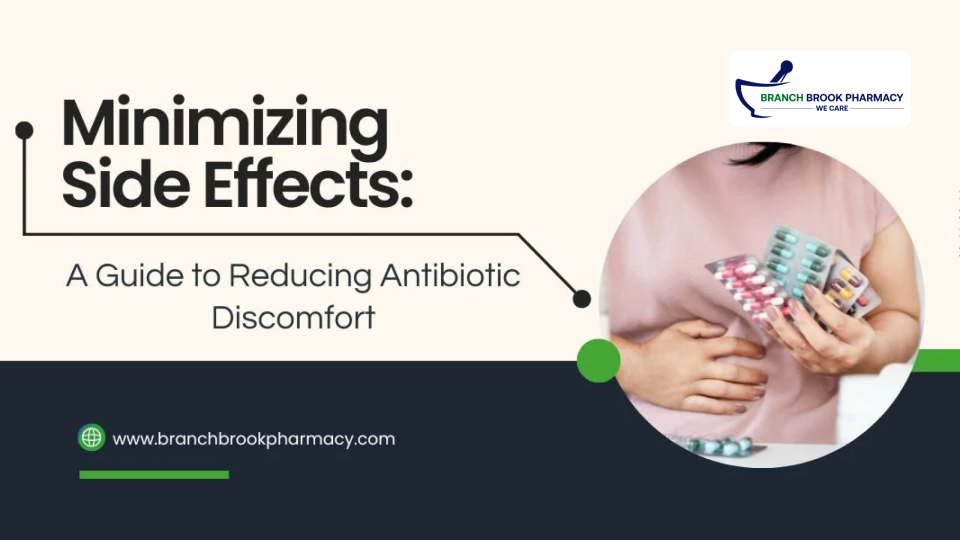
Antibiotics are essential medications for treating bacterial infections, but they often come with unwanted side effects. From nausea to fatigue, antibiotic discomfort can interfere with your daily life and make treatment more challenging. Fortunately, there are ways to manage and reduce these side effects effectively.
In this guide, we’ll explore antibiotic discomfort tips, common side effects, and actionable strategies for minimizing discomfort during antibiotic use. By following these insights, you can ease the burden of side effects and ensure a smoother recovery.
Understanding Antibiotic Discomfort
Antibiotics work by targeting and eliminating harmful bacteria. While highly effective, they can sometimes affect beneficial bacteria in your body, leading to antibiotic-related discomfort.
Common Antibiotic Side Effects
Understanding the typical side effects of antibiotics can help you recognize and address them early. These include:
- Nausea and vomiting
- Diarrhea or loose stools
- Fatigue or weakness
- Yeast infections
- Allergic reactions, such as rashes
By knowing the common antibiotic side effects, you can take steps to mitigate their impact and prevent further complications.
Why Do Antibiotics Cause Discomfort?
Antibiotics disrupt the natural balance of bacteria in your body, particularly in your gut. This imbalance can lead to digestive issues, such as bloating, diarrhea, or nausea. Additionally, some antibiotics may cause irritation in the stomach lining, resulting in antibiotic discomfort.
Tips for Safe Antibiotic Use
Proper use of antibiotics is crucial for minimizing side effects and ensuring effective treatment. Follow these tips for safe antibiotic use:
- Follow Your Doctor’s Instructions
Take antibiotics exactly as prescribed, including the correct dosage and duration. Stopping treatment early or skipping doses increases the risk of side effects and antibiotic resistance.
- Avoid Alcohol
Alcohol can interact negatively with certain antibiotics, worsening antibiotic-related discomfort and reducing effectiveness.
- Stay Hydrated
Drink plenty of water to help flush out toxins and reduce the impact of antibiotic discomfort on your digestive system.
- Eat Before Taking Antibiotics
Taking antibiotics on an empty stomach can exacerbate nausea. A light meal or snack before your dose can help prevent discomfort.
Reducing Antibiotic Side Effects
Minimizing side effects involves a combination of dietary changes, lifestyle adjustments, and remedies. Here are some effective strategies for reducing antibiotic side effects:
1. Incorporate Probiotics
Probiotics help replenish the good bacteria in your gut, countering the imbalance caused by antibiotics. Foods like yogurt, kefir, sauerkraut, and supplements can ease antibiotic discomfort and promote gut health.
2. Avoid Trigger Foods
Certain foods, such as spicy dishes, caffeine, and greasy meals, can irritate your stomach and worsen antibiotic discomfort. Stick to bland, easy-to-digest options during your course of treatment.
3. Take Antibiotics at the Same Time Daily
Consistency helps your body adjust to the medication, reducing the likelihood of side effects.
4. Space Out Probiotic and Antibiotic Intake
If taking probiotic supplements, ensure a gap of at least two hours between probiotics and antibiotics to maximize their effectiveness.
Remedies for Easing Antibiotic Side Effects
If you’re already experiencing antibiotic-related discomfort, try these remedies:
- Ginger Tea: Ginger’s natural anti-nausea properties can help with reducing nausea from antibiotics.
- BRAT Diet: This diet—bananas, rice, applesauce, and toast—is gentle on the stomach and can alleviate diarrhea.
- Electrolyte Solutions: If antibiotics cause diarrhea, electrolyte drinks can replenish lost fluids and minerals.
Preventing Antibiotic Discomfort

Prevention is always better than cure. Here are actionable strategies for preventing antibiotic discomfort before it starts:
- Discuss Alternatives with Your Doctor
If you’ve experienced severe antibiotic-related discomfort in the past, ask your doctor about alternative medications.
- Maintain a Balanced Diet
A nutrient-rich diet strengthens your immune system and minimizes the risk of side effects.
- Monitor Allergic Reactions
Keep an eye on symptoms like rashes or swelling, and contact your healthcare provider if these occur.
Managing Antibiotic-Related Discomfort for Better Outcomes
Managing medication side effects is crucial for completing your antibiotic course without complications. Whether it’s reducing nausea from antibiotics or addressing digestive issues, the right approach can make a significant difference.
By incorporating probiotics, following a balanced diet, and adhering to your doctor’s instructions, you can effectively minimize antibiotic discomfort and ensure a smoother recovery.
Final Thoughts
Antibiotics are powerful tools in fighting infections, but they often come with challenges. Understanding common antibiotic side effects, taking preventive measures, and following these antibiotic discomfort tips can significantly improve your experience.
If side effects persist or worsen, consult your healthcare provider immediately. With the right strategies and awareness, you can reduce antibiotic-related discomfort and focus on getting back to good health.
By staying informed and proactive, you can ease antibiotic discomfort and navigate your treatment with confidence.

